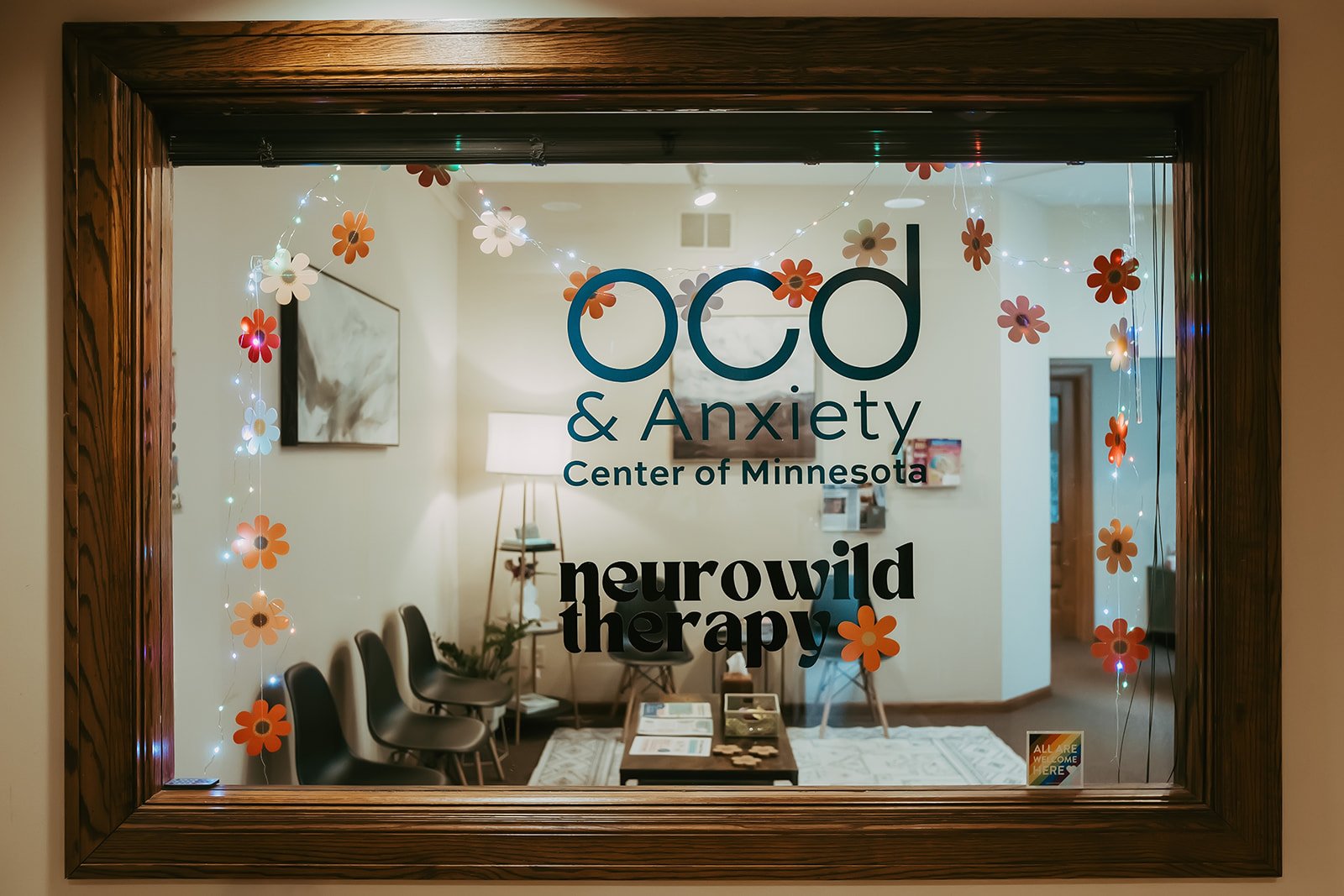Section Styles full-width overflow-decor
What is OCD?Obsessive-Compulsive Disorder
Obsessive-Compulsive Disorder (OCD) involves persistent, distressing, and intrusive thoughts (obsessions) that lead to repetitive and ritualistic behaviors (compulsions) aimed at reducing anxiety.
These compulsions provide temporary relief but perpetuate the cycle of anxiety in OCD.
Our evidence-based treatments drastically reduce this cycle and decrease these unhelpful thoughts and behaviors.
OCD can manifest in a variety of waysThe following are just a few of the types of OCD we treat at our clinic.*
*These are common OCD themes, however OCD can essentially attach to anything as an obsession and create limitless compulsions. If you are unsure if your symptoms are OCD, we can help you with that.
-
Common Obsessions: Fear of bodily waste or fluids, germs, chemicals, or other “contaminants”.
Common Compulsions: Washing hands ritually or excessively, cleaning, decontaminating, avoiding, reassurance-seeking, researching/Googling.
-
Common Obsessions: Fear of violently harming self or others, fear of losing control and causing harm, violent intrusive thoughts.
Common Compulsions: Avoidance of triggering objects (e.g. knives), avoidance of triggering media, ruminating, checking violent intrusive thoughts, checking environment for things that may cause harm, avoiding triggering environments or situations, confessing.
-
Common Obsessions: Excessive fear about one’s health or mortality, fear of having or getting an illness (e.g. cancer, Parkinsons).
Common Compulsions: Excessive checking or scanning one’s body for symptoms, excessive google searching or researching about feared illnesses or symptoms, excessive reassurance-seeking or avoidance of medical professionals/procedures, excessive medical appointments/testing.
-
Common Obsessions: Fear of being sexually attracted to children, fear of being a pedophile, intrusive thoughts and images about children.
Common Compulsions: Avoiding children, checking feelings and sensations to see if attracted to children, compulsively ruminating or reviewing behavior, thoughts, or feelings around children.
Treatment and ManagementWhile there is no cure for OCD, it can be managed effectively with treatment.
We use a variety of therapy protocols to treat OCD and anxiety disorders. Many are complementary and may be used in tandem.
-
ERP involves a structured approach to confronting obsessive triggers. During therapy, individuals intentionally expose themselves to distressing thoughts, situations, places, or objects that typically trigger their OCD symptoms. Simultaneously, they work on refraining from engaging in compulsive behaviors, rituals, or excessive rumination. Over time, this process helps individuals build tolerance to their anxiety and reduce the power of OCD, ultimately leading to greater symptom control and improved quality of life.
-
I-CBT focuses on identifying and challenging the specific inferences and cognitive distortions that drive obsessive thoughts and compulsive behaviors. By addressing these core cognitive processes, this therapy aims to reduce the distress and interference caused by OCD symptoms.
-
CBT is an evidence-based therapeutic approach that empowers individuals to challenge and change cognitive distortions, unhelpful thinking patterns, irrational assumptions, and negative self-beliefs. By fostering self-awareness and practical problem-solving skills, CBT helps individuals develop healthier coping strategies, manage their emotions, and address a wide range of mental health challenges for improved overall well-being.
-
Radically Open Dialectical Behavior Therapy (RO-DBT) is a form of therapy designed to treat disorders associated with overcontrol, such as chronic depression and treatment-resistant anxiety. It focuses on enhancing social connectedness, flexibility, and openness, which can be beneficial for individuals with OCD who exhibit overcontrolled traits like perfectionism and excessive caution. By addressing these underlying personality features, RO-DBT can potentially improve the effectiveness of standard OCD treatments and enhance overall functioning and quality of life.
-
Recreational Therapy offers structured, enjoyable activities, customized to meet each client's unique needs and goals. Our diverse program includes yoga and meditation, creative movement, leisure education, discussion-based activities, creative arts, and so much more to reach goals, establish/maintain a healthy leisure lifestyle, and improve overall quality of life. More than symptom management, it's about empowering individuals through achievement, enhancing self-esteem and confidence. Recreation Therapy sessions encourage the practice of mindfulness, helping to focus on the present and alleviate negative thought patterns.
Additionally, we offer controlled exposure exercises in a supportive environment, effectively addressing specific fears and anxieties.
-
Mindfulness therapy is a therapeutic approach that cultivates present-moment awareness, helping individuals develop a non-judgmental, accepting attitude toward their thoughts, emotions, and sensations. Through mindfulness techniques and practices, it promotes mental clarity, emotional resilience, and improved overall well-being.
-
SPACE, or Supportive Parenting for Anxious Childhood Emotions, is a parent-based treatment program created by Dr. Eli Lebowitz at the Yale Child Study Center. It is specifically designed to help children and adolescents who are dealing with anxiety disorders, including Obsessive-Compulsive Disorder (OCD), and related emotional challenges. While the children themselves do not attend SPACE sessions, they are the primary focus of the treatment as patients.
This program has undergone rigorous testing through randomized controlled clinical trials, demonstrating its effectiveness. The core objective of SPACE is to empower parents with strategies and techniques to support their children's emotional well-being and address anxiety and OCD symptoms. As a result of successful SPACE treatment, children often experience reduced anxiety and improved overall functioning, highlighting the program's positive impact on their lives.
-
DBT is a comprehensive and evidence-based therapeutic approach that combines cognitive-behavioral techniques with mindfulness and acceptance strategies. It is particularly effective in helping individuals with emotional regulation difficulties, borderline personality disorder, and other mental health challenges. DBT equips individuals with practical skills to manage intense emotions and improve interpersonal relationships.
OCD & Anxiety Center of Minnesota
•
OCD & Anxiety Center of Minnesota •
Our commitment to embracing diversity and ensuring inclusivity.
We believe healing is for everyone. That’s why we're dedicated to creating a welcoming environment that respects and values the uniqueness of each individual's journey.

Section Styles full-width overflow-decor
Recognizing OCD in oneself or a loved one is the first step toward healing.
If you or someone you know is struggling with obsessive-compulsive disorder, know that help is available. Together, we can work towards a life not defined by OCD.





